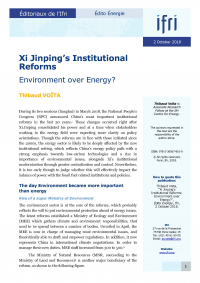Gateway to Think Tanks
| 来源类型 | Publications - Editorials - Édito Énergie |
| 规范类型 | 评论 |
| DOI | 978-2-36567-916-9 |
| Xi Jinping’s Institutional Reforms: Environment over Energy? Edito Energie, October 2018 | |
| Thibaud VOÏTA | |
| 发表日期 | 2018-10-02 |
| 出处 | Édito Énergie |
| 出版年 | 2018 |
| 概述 | During its two sessions (lianghui) in March 2018, the National People’s Congress (NPC) announced China’s most important institutional reforms in the last 30 years. These changes occurred right after Xi Jinping consolidated his power and at a time when stakeholders working in the energy field... |
| 摘要 |
Xi Jinping’s Institutional Reforms: Environment over Energy? Edito Energie, October 2018
During its two sessions (lianghui) in March 2018, the National People’s Congress (NPC) announced China’s most important institutional reforms in the last 30 years. These changes occurred right after Xi Jinping consolidated his power and at a time when stakeholders working in the energy field were expecting more clarity on policy orientations. 
Xi Jinping’s Institutional Reforms: Environment over Energy?
Download
0.67 Mo
Though the reforms are in line with those initiated since the 2000s, the energy sector is likely to be deeply affected by the new institutional setting, which reflects China’s energy policy path with a strong emphasis towards low-carbon technologies and a rise in importance of environmental issues, alongside Xi’s institutional modernization through greater centralization and control. Nevertheless, it is too early though to judge whether this will effectively impact the balance of power with the fossil fuel related institutions and policies. The day Environment became more important than energy The environment sector is at the core of the reforms, which probably reflects the will to put environmental protection ahead of energy issues. The latest reforms established a Ministry of Ecology and Environment (MEE) which gathers climate and environment responsibilities, that used to be spread between a number of bodies. Unveiled in April, the MEE is now in charge of managing most environmental issues, and theoretically able to draft and empower regulations. In addition, it now represents China in international climate negotiations. In order to manage these new duties, MEE staff increased from 300 to 500.
|
| 关键词 | climate change Energy energy policy Environment Governance Xi Jinping China |
| URL | https://www.ifri.org/en/publications/editoriaux-de-lifri/edito-energie/xi-jinpings-institutional-reforms-environment-over |
| 来源智库 | French Institute of International Relations (France) |
| 引用统计 | |
| 资源类型 | 智库出版物 |
| 条目标识符 | http://119.78.100.153/handle/2XGU8XDN/416433 |
| 推荐引用方式 GB/T 7714 | Thibaud VOÏTA. Xi Jinping’s Institutional Reforms: Environment over Energy? Edito Energie, October 2018. 2018. |
| 条目包含的文件 | ||||||
| 文件名称/大小 | 资源类型 | 版本类型 | 开放类型 | 使用许可 | ||
| edito_voita_xi_jinpi(46KB) | 智库出版物 | 限制开放 | CC BY-NC-SA |  浏览 | ||
| voita_xi_jinping_ins(690KB) | 智库出版物 | 限制开放 | CC BY-NC-SA | 浏览 | ||
除非特别说明,本系统中所有内容都受版权保护,并保留所有权利。